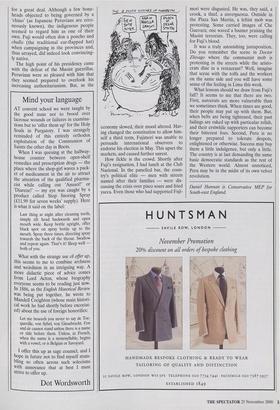Mind your language
AT convent school we were taught by the good nuns not to brood over lacrosse wounds or failures in examina- tions but to 'offer them up' for the Holy Souls in Purgatory. I was strangely reminded of this entirely orthodox exploitation of the Communion of Saints the other day in Boots. When I was queuing at the halfway- house counter between open-shelf remedies and prescription drugs — the place where the shop-girl waves a pack- et of medicament in the air to attract the attention of the qualified pharma- cist while calling out `Anusol!' or `Diareze !' — my eye was caught by a product called Stop Snoring Spray (£11.99 for seven weeks' supply). Here is what it said on the label: Last thing at night after cleaning teeth, simply tilt head backwards and open mouth wide. Keep bottle upright, offer black spot on spray bottle up to the mouth. Spray three times, directing spray towards the back of the throat. Swallow and repeat again. That's it! Sleep well both of you.
What with the strange use of offer up, this seems to me to combine archness and weirdness in an intriguing way. A more didactic piece of advice comes from Lord Acton, whose biography everyone seems to be reading just now. In 1886, as the English Historical Review was being put together, he wrote to Mandell Creighton (whose main histori- cal work he had shortly before excoriat- ed) about the use of foreign honorifics: Let me beseech you never to say de Toc- queville, von Sybel, von Giesebrecht. Von and de cannot stand unless there is a name or title before them. Unless, in French, when the name is a monosyllable, begins with a vowel, or is Belgian or Savoyard.
I offer this up as sage counsel, and I hope in future not to find myself stum- bling so often across such solecisms with annoyance that at best I must strive to offer up.
Dot Wordsworth





























































































 Previous page
Previous page